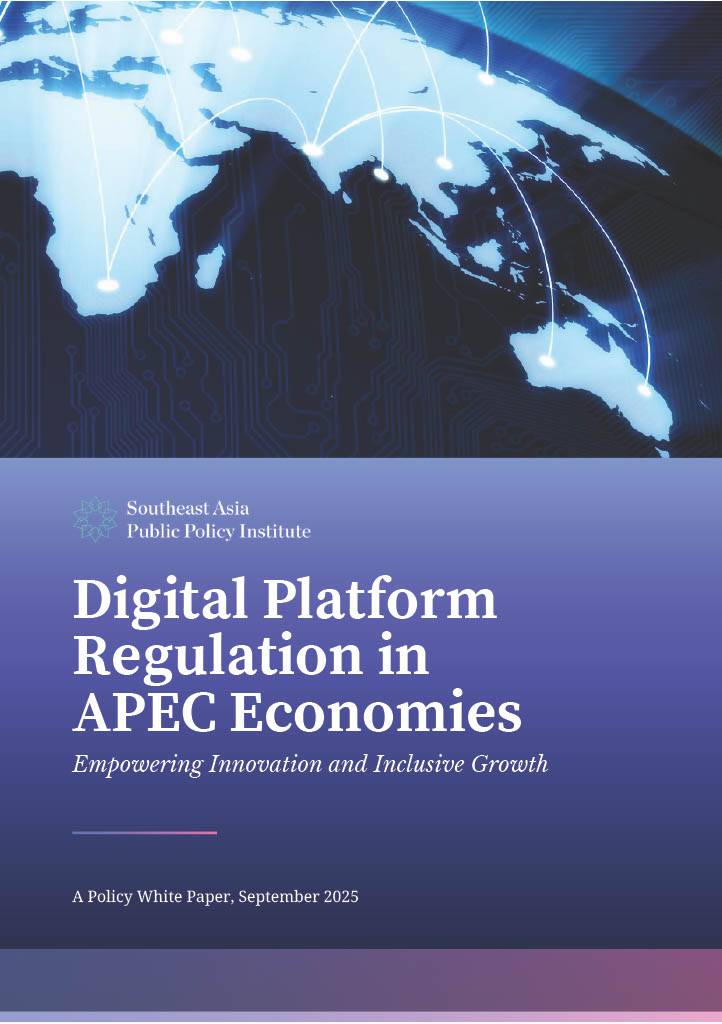New White Paper on Balanced Digital Platform Regulation Presented at APEC SME Ministerial in Jeju

Jeju, Republic of Korea – September 2025 – The Southeast Asia Public Policy Institute (SEAPPI) today launched its latest policy white paper, Toward Balanced Digital Platform Regulation in Southeast Asia: Empowering Innovation and Inclusive Growth, which will form the basis of discussions about the future of the digital economy during the APEC Small and Medium Enterprises Ministerial Meeting (SMEMM) in September.
The report, developed with support from the ACT | App Association, highlights how digital platforms have become critical infrastructure for commerce, payments, logistics, and communication across the Asia–Pacific, enabling millions of MSMEs that make up over 98 percent of enterprises in APEC and contribute 40–60 percent of GDP. At the same time, their systemic role raises important questions around competition, fairness, and consumer protection.
Drawing lessons from the European Union’s Digital Markets Act (DMA) and other global approaches, the white paper assesses how far these frameworks fit the realities of APEC economies. It finds that while the DMA addresses genuine pressure points—such as app-store fairness, ranking neutrality, and data access—its prescriptive obligations come with significant trade-offs. For MSMEs in particular, new rights are often offset by added compliance frictions, fragmented user experiences, and trust gaps.
To ground the assessment in evidence, SEAPPI conducted quantitative modelling of potential compliance costs if DMA-style rules were applied across nine APEC economies. The analysis estimates USD 3.07 billion in annual costs under a medium scenario, or 0.02 percent of combined GDP. While modest in macroeconomic terms, the distributional impact is stark: 70 percent of the burden, or USD 2.15 billion, would fall on MSMEs.
The report calls on APEC policymakers to treat the DMA as a reference point for debate rather than a ready-made blueprint. It recommends evidence-based, proportionate, and regionally compatible approaches—grounded in inclusive consultations, flexible tools such as sandboxes and phased rollouts, MSME support mechanisms, and coordinated regional standards.
“Digital platforms have flourished in APEC under light-touch regulation, driving innovation and inclusive growth. The challenge now is to update frameworks in a way that preserves these gains while addressing genuine risks,” said Ed Ratcliffe, Executive Director, Southeast Asia Public Policy Institute. “APEC markets have an opportunity to build smart, context-sensitive rules that safeguard fairness and trust without undermining the small businesses that power its digital economy.”
Download the full report here.
About the Southeast Asia Public Policy Institute
The Southeast Asia Public Policy Institute is a research institute based in Bangkok and Singapore, working across the region. Our mission is to support the development of solutions to the most pressing public policy challenges facing Southeast Asia in the 21st century. The Institute undertakes in-depth research to develop actionable policy solutions on a range of issues across sustainability, technology, public health, trade, and governance. We convene dialogues with stakeholders and decisionmakers to drive discussion on the challenges and opportunities facing markets across the region. The Institute draws on a network of in-market researchers, advisors, and partners to provide insights and recommendations for governments, policymakers, and businesses.
News and insights

New report launched at Global Anti-Scam Summit (GASS) 2025 Asia highlights innovative responses from public and private sectors to address scams in Southeast Asia


